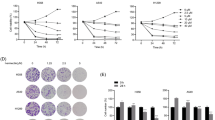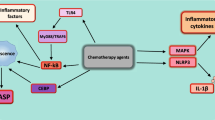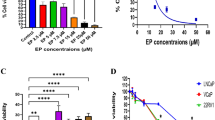Abstract
Combined oridonin (ORI), a natural and safe kaurene diterpenoid isolated from Rabdosia rubescens, and cetuximab (Cet), an anti-EGFR monoclonal antibody, have been reported to exert synergistic anti-tumor effects against laryngeal squamous cell carcinoma (LSCC) both in vitro and in vivo by our group. In the present study, we further found that ORI/Cet treatment not only resulted in apoptosis but also induced autophagy. AMPK/mTOR signaling pathway was found to be involved in the activation of autophagy in ORI/Cet-treated LSCC cells, which is independent of p53 status. Additionally, chromatin immunoprecipitation (ChIP) assay showed that ORI/Cet significantly increased the binding NF-κB family member p65 with the promotor of BECN 1, and p65-mediated up-regulation of BECN 1 caused by ORI/Cet is coupled to increased autophagy. On the other hand, we demonstrated that either Beclin 1 SiRNA or autophagy inhibitors could increase ORI/Cet induced-apoptosis, indicating that autophagy induced by combination of the two agents plays a cytoprotective role. Interestingly, 48 h after the combined treatment, autophagy began to decrease but apoptosis was significantly elevated. Our findings suggest that autophagy might be strongly associated with the antitumor efficacy of ORI/Cet, which may be beneficial to the clinical application of ORI/Cet in LSCC treatment.






Similar content being viewed by others
References
Codogno P, Meijer AJ (2005) Autophagy and signaling: their role in cell survival and cell death. Cell Death Differ 12:1509–1518
Chen N, Karantza V (2011) Autophagy as a therapeutic target in cancer. Cancer Biol Ther 11:157–168
Zeng X, Kinsella TJ (2011) Impact of autophagy on chemotherapy and radiotherapy mediated tumor cytotoxicity: “To Live or not to Live”. Front Oncol 1:30
Zhang H, Tang J, Li C, Kong J et al (2015) MiR-22 regulates 5-FU sensitivity by inhibiting autophagy and promoting apoptosis in colorectal cancer cells. Cancer Lett 356:781–790
Gong C, Song E, Codogno P et al (2012) The roles of BECN1 and autophagy in cancer are context dependent. Autophagy 8:1853–1855
Shinojima N, Yokoyama T, Kondo Y et al (2007) Roles of the Akt/mTOR/p70S6K and ERK1/2 signaling pathways in curcumin-induced autophagy. Autophagy 3:635–637
Wu Y, Ni Z, Yan X et al (2016) Targeting the MIR34C-5p-ATG4B- autophagy axis enhances the sensitivity of cervical cancer cells to pirarubicin. Autophagy 12:1105–1117
Kozyreva VK, Kiseleva A, Ice RJ et al (2016) Combination of eribulin and aurora A inhibitor MLN8237 prevents metastatic colonization and induces cytotoxic autophagy in breast cancer. Mol Cancer Ther 15:1809–1822
Yang ZJ, Chee CE, Huang S et al (2011) The role of autophagy in cancer: therapeutic implications. Mol Cancer Ther 10:1533–1541
Kumar D, Shankar S, Srivastava RK (2014) Rottlerin induces autophagy and apoptosis in prostate cancer stem cells via PI3K/Akt/mTOR signaling pathway. Cancer Lett 343:179–189
Green AS, Chapuis N, Lacombe C et al (2011) LKB1/AMPK/mTOR signaling pathway in hematological malignancies: from metabolism to cancer cell biology. Cell Cycle 10:2115–2120
Arsikin K, Kravic-Stevovic T, Jovanovic M et al (2012) Autophagy-dependent and -independent involvement of AMP-activated protein kinase in 6-hydroxydopamine toxicity to SH-SY5Y neuroblastoma cells. Biochim Biophys Acta 1822:1826–1836
Jing K, Song KS, Shin S et al (2011) Docosahexaenoic acid induces autophagy through p53/AMPK/mTOR signaling and promotes apoptosis in human cancer cells harboring wild-type p53. Autophagy 7:1348–1358
Niso-santano M, Criollo A, Malik SA et al (2012) Direct molecular interactions between Beclin 1 and the canonical NFκB activation pathway. Autophagy 8:268–270
Harris J (2011) Autophagy and cytokines. Cytokine 56:140–144
Kiyono K, Suzuki HI, Matsuyama H et al (2009) Autophagy is activated by TGF-beta and potentiates TGF-beta-mediated growth inhibition in human hepatocellular carcinoma cells. Cancer Res 69:8844–8852
Jiang Q, Wang Y, Li T et al (2011) Heat shock protein 90-mediated inactivation of nuclear factor-kappaB switches autophagy to apoptosis through becn1 transcriptional inhibition in selenite-induced NB4 cells. Mol Biol Cell 22:1167–1180
Ran W, Qian Z, Xin P et al (2016) Stellettin B induces G1 arrest, apoptosis and autophagy in human non-small cell lung cancer A549 cells via blocking PI3K/Akt/mTOR pathway. Sci Rep 6:27071
D’Anneo A, Carlisi D, Lauricella M et al (2013) Parthenolide generates reactive oxygen species and autophagy in MDA-MB231 cells. A soluble parthenolide analogue inhibits tumour growth and metastasis in a xenograft model of breast cancer. Cell Death Dis 4:e891
Li CY, Wang EQ, Cheng Y et al (2011) Oridonin: An active diterpenoid targeting cell cycle arrest, apoptotic and autophagic pathways for cancer therapeutics. Int J Biochem Cell Biol 43:701–704
Cui Q, Tashiro S, Onodera S et al (2007) Autophagy preceded apoptosis in oridonin-treated human breast cancer MCF-7 cells. Biol Pharm Bull 30:859–864
Kang N, Zhang JH, Qiu F et al (2010) Inhibition of EGFR signaling augments oridonin-induced apoptosis in human laryngeal cancer cells via enhancing oxidative stress coincident with activation of both the intrinsic and extrinsic apoptotic pathways. Cancer Lett 294:147–158
Zhang Y, Wu Y, Tashiro S et al (2009) Involvement of PKC signal pathways in oridonin-induced autophagy in HeLa cells: a protective mechanism against apoptosis. Biochem Biophys Res Commun 378:273–278
Kang N, Cao SJ, Zhou Y et al (2015) Inhibition of caspase-9 by oridonin, a diterpenoid isolated from Rabdosia rubescens, augments apoptosis in human laryngeal cancer cells. Int J Oncol 47:2045–2056
Cui Q, Tashiro S, Onodera S et al (2006) Augmentation of oridonin-induced apoptosis observed with reduced autophagy. J Pharmacol Sci 101:230–239
Ng K, Zhu AX (2008) Targeting the epidermal growth factor receptor in metastatic colorectal cancer. Crit Rev Oncol Hematol 65:8–20
Cao SJ, Xia MJ, Mao YW et al (2016) Combined oridonin with cetuximab treatment shows synergistic anticancer effects on laryngeal squamous cell carcinoma: involvement of inhibition of EGFR and activation of reactive oxygen species-mediated JNK pathway. Int J Oncol 49:2075–2087
Saik S, Sasazawa Y, Imamichi Y et al (2011) Caffeine induces apoptosis by enhancement of autophagy via PI3K/Akt/mTOR/p70S6K inhibition. Autophagy 7:176–187
Lu F, Kishida S, Mu P et al (2015) NeuroD1 promotes neuroblastoma cell growth by inducing the expression of ALK. Cancer Sci 106:390–396
Rosenfeldt MT, Ryan KM (2011) The multiple roles of autophagy in cancer. Carcinogenesis 32:955–963
Wang X, Hao MW, Dong K et al (2009) Apoptosis induction effects of EGCG in laryngeal squamous cell carcinoma cells through telomerase repression. Arch Pharm Res 32:1263–1269
Kuhar M, Imran S, Singh N (2007) Curcumin and quercetin combined with cisplatin to induce apoptosis in human laryngeal carcinoma Hep-2 cells through the mitochondrial pathway. J Cancer Mol 3:121–128
Kang N, Zhang JH, Qiu F et al (2010) Induction of G(2)/M phase arrest and apoptosis by oridonin in human laryngeal carcinoma cells. J Nat Prod 73:1058–1063
Li X, Li X, Wang J et al (2012) Oridonin up-regulates expression of P21 and induces autophagy and apoptosis in human prostate cancer cells. Int J Biol Sci 8:901–912
Zang L, Xu Q, Ye Y et al (2012) Autophagy enhanced phagocytosis of apoptotic cells by oridonin-treated human histocytic lymphoma U937 cells. Arch Biochem Biophys 518:31–41
Zeng R, Chen Y, Zhao S et al (2012) Autophagy counteracts apoptosis in human multiple myeloma cells exposed to oridonin in vitro via regulating intracellular ROS and SIRT1. Acta Pharmacol Sin 33:91–100
Wang H, Yu Y, Jiang Z et al (2016) Next-generation proteasome inhibitor MLN9708 sensitizes breast cancer cells to doxorubicin-induced apoptosis. Sci Rep 6:26456
Wang J, Tan X, Yang Q et al (2016) Inhibition of autophagy promotes apoptosis and enhances anticancer efficacy of adriamycin via augmented ROS generation in prostate cancer cells. Int J Biochem Cell Biol 77:80–90
Milano V, Piao Y, LaFortune T et al (2009) Dasatinib-induced autophagy is enhanced in combination with temozolomide in glioma. Mol Cancer Ther 8:394–406
Cheng Y, Zhang Y, Zhang L et al (2012) MK-2206, a novel allosteric inhibitor of Akt, synergizes with gefitinib against malignant glioma via modulating both autophagy and apoptosis. Mol Cancer Ther 11:154–164
Zeng R, He J, Peng J et al (2012) The time-dependent autophagy protects against apoptosis with possible involvement of Sirt1 protein in multiple myeloma under nutrient depletion. Ann Hematol 91:407–417
Corcelle E, Djerbi N, Mari M et al (2007) Control of the autophagy maturation step by the MAPK ERK and p38: lessons from environmental carcinogens. Autophagy 3:57–59
Zhang J, Chiu JF, Zhang HW et al (2013) Autophagic cell death induced by resveratrol depends on the Ca(2+)/AMPK/mTOR pathway in A549 cells. Biochem Pharmacol 86:317–328
Chen L, Jiang Z, Ma H et al (2016) Volatile oil of Acori Graminei Rhizoma-induced apoptosis and autophagy are dependent on p53 status in human glioma cells. Sci Rep 6:21148
An HK, Kim KS, Lee JW et al (2016) Mimulone-induced autophagy through p53-mediated AMPK/mTOR pathway increases caspase-mediated apoptotic cell death in A549 human lung cancer cells. PLoS ONE 9:e114607
Amin AR, Khuri FR, Chen ZG et al (2009) Synergistic growth inhibition of squamous cell carcinoma of the head and neck by erlotinib and epigallocatechin-3-gallate: the role of p53-dependent inhibition of nuclear factor-kappaB. Cancer Prev Res 2:538–545
Vequaud E, Seveno C, Loussouarn D et al (2015) YM155 potently triggers cell death in breast cancer cells through an autophagy-NF-κB network. Oncotarget 6:13476–13486
Li T, Zhang Q, Zhang J et al (2014) Fenofibrate induces apoptosis of triple-negative breast cancer cells via activation of NF-κB pathway. BMC Cancer 14:96
Zhao B, Ma Y, Xu Z et al (2014) Hydroxytyrosol, a natural molecule from olive oil, suppresses the growth of human hepatocellular carcinoma cells via inactivating AKT and nuclear factor-kappa B pathways. Cancer Lett 347:79–87
Copetti T, Bertoli C, Dalla E et al (2009) p65/RelA modulates BECN1 transcription and autophagy. Mol Cell Biol 29:2594–25608
Park SE, Yi HJ, Suh N et al (2016) Inhibition of EHMT2/G9a epigenetically increases the transcription of Beclin-1 via an increase in ROS and activation of NF-kappaB. Oncotarget 7:39796–39808
Acknowledgements
This work was supported by the National Natural Science Foundation of China (Grant Numbers: 81373797 and 81102855). This study is also supported by the China Postdoctoral Science Special Foundation (Grant Number: 2014T70224) and the China Postdoctoral Science Foundation (Grant Number: 2013M541192).
Author information
Authors and Affiliations
Corresponding author
Ethics declarations
Conflict of interest
The authors declare no conflict of interest.
Electronic supplementary material
Below is the link to the electronic supplementary material.
Rights and permissions
About this article
Cite this article
Cao, S., Huang, Y., Zhang, Q. et al. Molecular mechanisms of apoptosis and autophagy elicited by combined treatment with oridonin and cetuximab in laryngeal squamous cell carcinoma. Apoptosis 24, 33–45 (2019). https://doi.org/10.1007/s10495-018-1497-0
Published:
Issue Date:
DOI: https://doi.org/10.1007/s10495-018-1497-0




